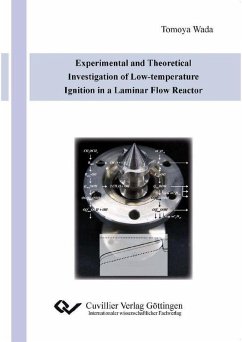The main purpose of this dissertation is to investigate low-temperature ignition in detail. In the previous findings with conventional fuels such as diesel, gasoline, or jet fuels, first- and second-stage ignitions are observed in the negative temperature coefficient regime due to high- and low-temperature chemistry (LTC and HTC). As results from these investigations have shown, it is well-known that this temperature regime has high potential to reduce emission in applications. In general, these ignitions are observed sequentially (i.e., two ignition processes are observed as the overall-ignition). On the other hand, the importance of first-stage ignition due to low-temperature chemistry has been noted as one of the dominant phenomena in the overall-ignition process. In order to observe the ignition at low temperatures, a laminar flow reactor (LFR) has been developed. This LFR allows the experimental observations of only low-temperature ignition (i.e., first-stage ignition (FSI)). In other words, LFR extracts only FSI from the overall-ignition process. N-heptane, dimethyl ether and their mixtures are chosen as fuels. The entire LFR remains at isothermal conditions. Temperature increase due to the FSI in LFR and the products from FSI are experimentally measured. Numerical calculations are conducted to simulate the experiments. Based on the experimentally and numerically determined results theoretical models are established.
Combustion and flame
http://www.journals.elsevier.com/combustion-and-flame/
Combustion Science and Technology
Combustion Theory and Modeling
Journal of combustion
http://www.hindawi.com/journals/jc/
International Journal of Chemical Kinetics
Proceedings of Combustion Institute
http://www.journals.elsevier.com/proceedings-of-the-combustion-institute
Dieser Download kann aus rechtlichen Gründen nur mit Rechnungsadresse in A, B, BG, CY, CZ, D, DK, EW, E, FIN, F, GR, HR, H, IRL, I, LT, L, LR, M, NL, PL, P, R, S, SLO, SK ausgeliefert werden.


